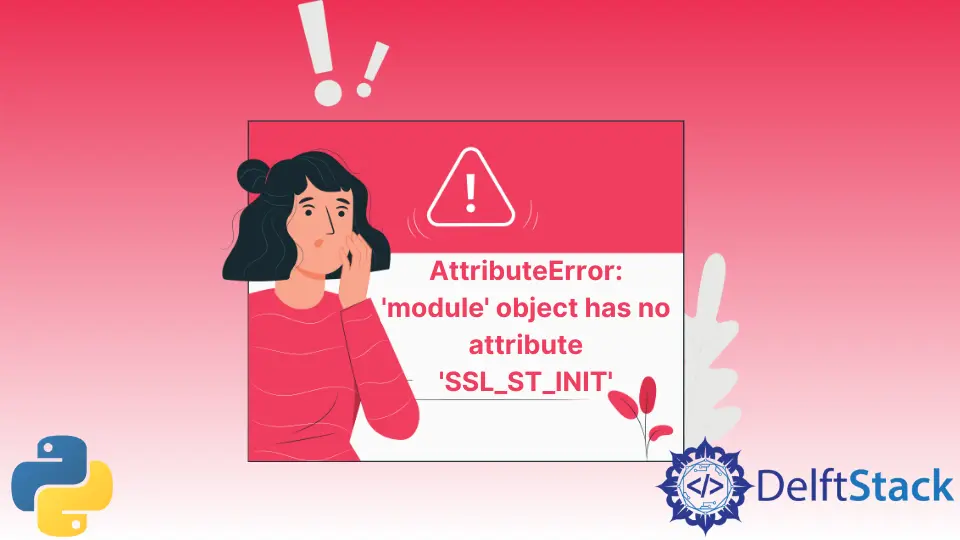How to Fix the AttributeError: Module Object Has No Attribute SSL_ST_INIT in Python
-
Understanding the
AttributeError: 'module' object has no attribute 'SSL_ST_INIT'Error in Python -
Fix the
AttributeError: 'module' object has no attribute 'SSL_ST_INIT'in Python - Conclusion

Python’s ssl module provides a secure socket layer for encrypted network communication. However, encountering the error "AttributeError: 'module' object has no attribute 'SSL_ST_INIT'" can be perplexing.
The AttributeError: 'module' object has no attribute 'SSL_ST_INIT' error is raised when using the SSL module in Python because the SSL module is not available in the Python standard library.
This article aims to comprehensively address the potential causes of this error and give detailed solutions to resolve it.
Understanding the AttributeError: 'module' object has no attribute 'SSL_ST_INIT' Error in Python
The error "AttributeError: 'module' object has no attribute 'SSL_ST_INIT'" suggests that the SSL_ST_INIT attribute is not found within the ssl module. This could be due to various reasons, including incompatible Python versions, missing dependencies, or a corrupt SSL module installation.
This is an error that can occur when using the SSL module in Python. This error is caused by the SSL module not being installed or not being properly configured.
There are various ways to fix this error; one of them is that you need to install the SSL module and configure it correctly.
Fix the AttributeError: 'module' object has no attribute 'SSL_ST_INIT' in Python
The AttributeError: 'module' object has no attribute 'SSL_ST_INIT' error is a Python error that may occur when trying to run a Python script that uses the SSL module. A missing SSL certificate file causes this error.
The SSL certificate file is required for the SSL module to work properly. The different ways to fix the AttributeError: 'module' object has no attribute 'SSL_ST_INIT' error are listed below.
Update the SSL Module
This command uses the pip package installer with elevated privileges (sudo) to install or upgrade the pyopenssl Python package. This library, which wraps around the OpenSSL library, enables Python programs to utilize OpenSSL for cryptographic functions.
The -U flag ensures that the package is upgraded to the latest version.
$ sudo pip install -U pyopenssl
Use easy_install to Upgrade pyopenssl
This command utilizes the easy_install tool with elevated privileges (sudo) to upgrade the pyopenssl Python package. This command is similar to the pip command but uses the easy_install approach for package management.
The --upgrade flag ensures that the pyopenssl package is upgraded to the latest version available. The command is executed in a terminal or command prompt.
sudo python -m easy_install --upgrade pyopenssl
Use pip to Reinstall the SSL Module Through the Command Line Interface
A missing or corrupted OpenSSL library might lead to attribute-related errors. Reinstalling the OpenSSL library can resolve this issue.
We can uninstall the SSL module using the following code:
pip uninstall pyopenssl
Then, for reinstalling, the code will be:
pip install pyopenssl
Here’s another way of reinstalling using a different command:
Use a package manager like apt (for Debian-based systems) or brew (for macOS) to install OpenSSL.
# For Debian-based systems
sudo apt-get install libssl-dev
# For macOS, using Homebrew
brew install openssl
After installing OpenSSL, reinstall the SSL module using pip.
pip install --upgrade --force-reinstall pyOpenSSL
Upgrade Python Version
Ensure that you’re using a Python version that supports the SSL_ST_INIT attribute. This attribute is part of the OpenSSL library, and compatibility might vary across Python versions.
- Check Python Version:
- Confirm your Python version by running
python --versionorpython3 --version.
- Confirm your Python version by running
- Upgrade Python:
- If you are using an outdated version, consider upgrading Python to the latest stable release. You can download the latest version of Python here.
Check SSL Module Version
Mismatched versions of the ssl module and the underlying OpenSSL library can cause attribute errors. Verify the versions to ensure compatibility.
Use the following Python code to check the ssl module version:
import ssl
print(ssl.OPENSSL_VERSION)
Use the openssl command-line tool to check the installed OpenSSL library version:
openssl version
Ensure that the versions reported by both checks are compatible.
Check for Circular Imports
In some cases, circular imports might lead to attribute errors. Ensure that your code or any third-party packages do not interfere with the ssl module’s namespace.
- Review Codebase:
- Inspect your codebase for circular imports that might affect the
sslmodule.
- Inspect your codebase for circular imports that might affect the
- Update Third-Party Packages:
- If using third-party packages, ensure they are up to date.
- Consider updating packages with
pip install --upgrade <package>.
Reinstall Python
If all else fails, reinstalling Python can resolve underlying issues with the ssl module and its dependencies. Use the appropriate package manager to uninstall Python completely.
After uninstalling, reinstall Python using the official distribution or package manager. Reinstalling Python can vary depending on your operating system.
For Linux (Ubuntu/Debian):
-
Uninstall Python:
sudo apt-get remove python -
Install Python:
sudo apt-get install python
For macOS:
- Uninstall Python using Homebrew:
brew uninstall python
-
Install Python using Homebrew:
brew install python
For Windows:
- Uninstall Python:
- Go to
"Control Panel">"Programs">"Programs and Features". - Find Python in the list, right-click, and choose
"Uninstall".
- Go to
- Download and Install Python:
- Visit the official Python website to download the latest version.
- Run the installer and make sure to check the option that says
"Add Python X.X to PATH"during the installation.
Conclusion
The "AttributeError: 'module' object has no attribute 'SSL_ST_INIT'" error can be resolved through a systematic approach. This article has given a detailed exploration of various methods, including upgrading Python, reinstalling OpenSSL, checking module versions, investigating circular imports, and, as a last resort, reinstalling Python.
By following these comprehensive steps and understanding the underlying causes, developers can effectively troubleshoot and resolve the attribute error related to the SSL_ST_INIT attribute in the ssl module. Remember to document each step and carefully review your code and dependencies to ensure a robust and error-free Python environment.
Zeeshan is a detail oriented software engineer that helps companies and individuals make their lives and easier with software solutions.
LinkedInRelated Article - Python Error
- Can Only Concatenate List (Not Int) to List in Python
- How to Fix Value Error Need More Than One Value to Unpack in Python
- How to Fix ValueError Arrays Must All Be the Same Length in Python
- Invalid Syntax in Python
- How to Fix the TypeError: Object of Type 'Int64' Is Not JSON Serializable
- How to Fix the TypeError: 'float' Object Cannot Be Interpreted as an Integer in Python
